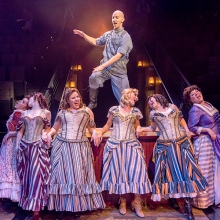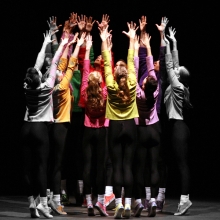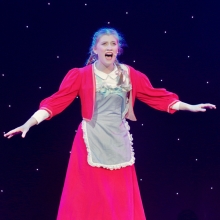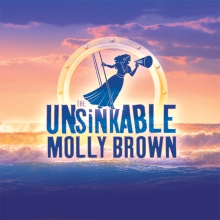John Barry

John Barry
Few composers of the late 20th Century enjoyed as much popular success or worldwide influence as John Barry. The winner of five Oscars, four Grammys and other honors ranging from the Golden Globe to Britain's Anthony Asquith Award, he wrote some of the most memorable movie music of our time: Born Free, Midnight Cowboy, Goldfinger, Out of Africa,Dances with Wolves, Somewhere in Time and dozens of other scores. Critics marvelled for decades at the Barry touch, a remarkable ability to capture the mood and flavor of every kind of movie, from the fanciful adventure of a James Bond thriller to the epic romantic visions of leading filmmakers, while retaining a style that is uniquely his own.
He was born John Barry Prendergast in York, England, in 1933. His father owned a chain of theatres, where John worked as a youth and where he first became fascinated by both movies and movie music. He played the trumpet and studied music throughout his teen years, as well as during a three-year stint in the Army (including correspondence-course instruction with famed Stan Kenton arranger Bill Russo). After leaving the service, he formed a band, the John Barry Seven, which played rock 'n' roll at various live venues and on such seminal TV dance shows as Six-Five Special, Oh Boy! and Drumbeat. By 1958 his band was backing up-and-coming rock star Adam Faith, and when Faith made his film debut in the 1960 film Beat Girl, it was Barry who supplied its hip jazz and rock score. Beat Girl became the first British movie to issue a soundtrack on long playing records.
Barry's experiments with string arrangements (notably on his original album, Stringbeat), his arranger producer credits for EMI artists, and his long held desire to compose using a broader musical canvas, soon led to a series of assignments for low budget films. All that changed when James Bond entered the picture in 1962. Barry turned The James Bond Theme, written for the first Bond movie, Dr. No, into a commercial success, making him first choice of producers Albert R. Broccoli and Harry Saltzman to write the scores for subsequent films. His bold, brassy and exciting music became a key element of the Bond formula. He scored From Russia With Love, pushed The Beatles out of the no. 1 album spot in America with Goldfinger, and maintained the tradition throughout the 60s with Thunderball, You Only Live Twice and On Her Majesty's Secret Service. The latter was especially noteworthy for Barry's collaboration with lyricist Hal David and vocalist Louis Armstrong on the touching love song "We Have All the Time in the World."
Barry remained James Bond's composer through three decades and three more Bonds (George Lazenby, Roger Moore, Timothy Dalton), 12 films in all, to 1987's The Living Daylights. His Bond title songs have been performed by some of the hottest names in popular music, from Shirley Bassey (Goldfinger, Diamonds Are Forever) to Duran Duran (A View to a Kill), Chrissie Hynde and a-ha (The Living Daylights). But, while Barry was becoming world-famous for his Bond music, he was also embracing very different musical styles for very different movies in the mid-60s: a light and lyrical touch for the African-lion family film Born Free, which won him Oscars for Best Song and Best Score; a taut, dramatic and surprisingly American score for producer Sam Spiegel's all-star The Chase; and jazzy contemporary organ solos for Richard Lester's films, just to name a few.
Originally considered an action composer - largely on the basis of his famed James Bond scores - Barry began to shed that label with several richly romantic scores in the 70s and 80s, notably the Sean Connery-Audrey Hepburn Robin Hood tale Robin and Marian and the cult favorite Somewhere in Time, whose multiple cable TV showings turned the soundtrack into a gold-record hit. A steamy, jazz-inflected score for Body Heat followed, as did an expansive, moving and unforgettable score for Sydney Pollack's film Out of Africa, which won Barry his fourth Academy Award. He also won a Grammy and a Golden Globe for Out of Africa, and collected yet another Grammy for his music for Francis Ford Coppola's The Cotton Club.
A serious illness in 1988 led to a long recuperation period for the composer. He returned after a two-year hiatus with a complex and thrilling symphonic score for Kevin Costner's epic western Dances With Wolves, earning him a fifth Oscar and a fourth Grammy. After that, there have been a variety of accomplishments in many different arenas of music, including another Oscar nomination (for the melancholy score of Chaplin) and a 3-D IMAX movie (the New York travelogue Across the Sea of Time). The year 1995 was of particular note, with strong dramatic scores produced for The Scarlet Letter and Cry, The Beloved Country. He had three scores rejected or withdrawn in the 1990's, however: The Horse Whisperer (1998), Goodbye, Lover (1998), and Year of the Comet (1992).
Barry was serious about his professional privacy. He did not want to be pressured by directors, producers, or music supervisors (which he detests). He turned down assignments for The Prince of Tides because he didn't want to report everyday to Barbara Streisand; nor did he agree to score Sleepless in Seattle after discovering that he'd have to share time with 20 songs that the producers wanted on the album. He enjoyed conducting in private, among the knowledgeable musicians of Los Angeles. Of his own scores, Barry's favorites were The Lion in the Winter, the massive, 1968 Academy Award winning score, Zulu, with a theme that was re-used in 1995's Cry, The Beloved Country, and his Academy Award winning efforts for Out of Africa and Dances with Wolves. His least favorite of his own 1986 works were Howard the Duck, which he tried desperately to have pulled from the film (but failed), and The Golden Child, in which Barry was partially successful in having his own score pulled from the film. Barry also recalled that his least favorite recording experience was Born Free, which had a very hurried production schedule.
In Spring 1998, John Barry signed to Decca Records as a recording artist, which led to the release of The Beyondness of Things, his first album of non-soundtrack music for 25 years. This lush and colourful album of original music also heralded his triumphant return to the concert hall: he conducted the English Chamber Orchestra in London's Royal Albert Hall in 1998 and then again in 1999. His final release on Decca is a collection of jazz tunes for Miramax's Playing by Heart, expanded considerably for the album. In June 1999, John Barry was named an Officer of the British Empire by Queen Elizabeth II for his outstanding achievements in music. Then, in October 1999, he was honored at London's annual Music Industry Trust Dinner, a star-studded benefit that raised more than $200,000 for charity. He retired in Oyster Bay, New York, with his wife, Laurie, and son, Jonpatrick, before his eventual death in 2011.
Barry's experiments with string arrangements (notably on his original album, Stringbeat), his arranger producer credits for EMI artists, and his long held desire to compose using a broader musical canvas, soon led to a series of assignments for low budget films. All that changed when James Bond entered the picture in 1962. Barry turned The James Bond Theme, written for the first Bond movie, Dr. No, into a commercial success, making him first choice of producers Albert R. Broccoli and Harry Saltzman to write the scores for subsequent films. His bold, brassy and exciting music became a key element of the Bond formula. He scored From Russia With Love, pushed The Beatles out of the no. 1 album spot in America with Goldfinger, and maintained the tradition throughout the 60s with Thunderball, You Only Live Twice and On Her Majesty's Secret Service. The latter was especially noteworthy for Barry's collaboration with lyricist Hal David and vocalist Louis Armstrong on the touching love song "We Have All the Time in the World."
Barry remained James Bond's composer through three decades and three more Bonds (George Lazenby, Roger Moore, Timothy Dalton), 12 films in all, to 1987's The Living Daylights. His Bond title songs have been performed by some of the hottest names in popular music, from Shirley Bassey (Goldfinger, Diamonds Are Forever) to Duran Duran (A View to a Kill), Chrissie Hynde and a-ha (The Living Daylights). But, while Barry was becoming world-famous for his Bond music, he was also embracing very different musical styles for very different movies in the mid-60s: a light and lyrical touch for the African-lion family film Born Free, which won him Oscars for Best Song and Best Score; a taut, dramatic and surprisingly American score for producer Sam Spiegel's all-star The Chase; and jazzy contemporary organ solos for Richard Lester's films, just to name a few.
Originally considered an action composer - largely on the basis of his famed James Bond scores - Barry began to shed that label with several richly romantic scores in the 70s and 80s, notably the Sean Connery-Audrey Hepburn Robin Hood tale Robin and Marian and the cult favorite Somewhere in Time, whose multiple cable TV showings turned the soundtrack into a gold-record hit. A steamy, jazz-inflected score for Body Heat followed, as did an expansive, moving and unforgettable score for Sydney Pollack's film Out of Africa, which won Barry his fourth Academy Award. He also won a Grammy and a Golden Globe for Out of Africa, and collected yet another Grammy for his music for Francis Ford Coppola's The Cotton Club.
A serious illness in 1988 led to a long recuperation period for the composer. He returned after a two-year hiatus with a complex and thrilling symphonic score for Kevin Costner's epic western Dances With Wolves, earning him a fifth Oscar and a fourth Grammy. After that, there have been a variety of accomplishments in many different arenas of music, including another Oscar nomination (for the melancholy score of Chaplin) and a 3-D IMAX movie (the New York travelogue Across the Sea of Time). The year 1995 was of particular note, with strong dramatic scores produced for The Scarlet Letter and Cry, The Beloved Country. He had three scores rejected or withdrawn in the 1990's, however: The Horse Whisperer (1998), Goodbye, Lover (1998), and Year of the Comet (1992).
Barry was serious about his professional privacy. He did not want to be pressured by directors, producers, or music supervisors (which he detests). He turned down assignments for The Prince of Tides because he didn't want to report everyday to Barbara Streisand; nor did he agree to score Sleepless in Seattle after discovering that he'd have to share time with 20 songs that the producers wanted on the album. He enjoyed conducting in private, among the knowledgeable musicians of Los Angeles. Of his own scores, Barry's favorites were The Lion in the Winter, the massive, 1968 Academy Award winning score, Zulu, with a theme that was re-used in 1995's Cry, The Beloved Country, and his Academy Award winning efforts for Out of Africa and Dances with Wolves. His least favorite of his own 1986 works were Howard the Duck, which he tried desperately to have pulled from the film (but failed), and The Golden Child, in which Barry was partially successful in having his own score pulled from the film. Barry also recalled that his least favorite recording experience was Born Free, which had a very hurried production schedule.
In Spring 1998, John Barry signed to Decca Records as a recording artist, which led to the release of The Beyondness of Things, his first album of non-soundtrack music for 25 years. This lush and colourful album of original music also heralded his triumphant return to the concert hall: he conducted the English Chamber Orchestra in London's Royal Albert Hall in 1998 and then again in 1999. His final release on Decca is a collection of jazz tunes for Miramax's Playing by Heart, expanded considerably for the album. In June 1999, John Barry was named an Officer of the British Empire by Queen Elizabeth II for his outstanding achievements in music. Then, in October 1999, he was honored at London's annual Music Industry Trust Dinner, a star-studded benefit that raised more than $200,000 for charity. He retired in Oyster Bay, New York, with his wife, Laurie, and son, Jonpatrick, before his eventual death in 2011.
Questions & Answers
There don't appear to be any questions submitted.
Callboard
-
Shake and shimmy it with the #Hairspray20Challenge! Join MTI and Broadway Media in celebrating 20 years of #Hairspray. Duet this here or find us on TikTok! Special thanks to @broadwaymedia and @jammyprod. Choreography Guides are a licensor official resource that provides step-by-step instruction from Broadway and professional choreographers for your productions! Visit @broadwaymedia to learn more. #mtishows #youcantstopthebeat #hairspraymusical #goodmorningbaltimore
View on Instagram




